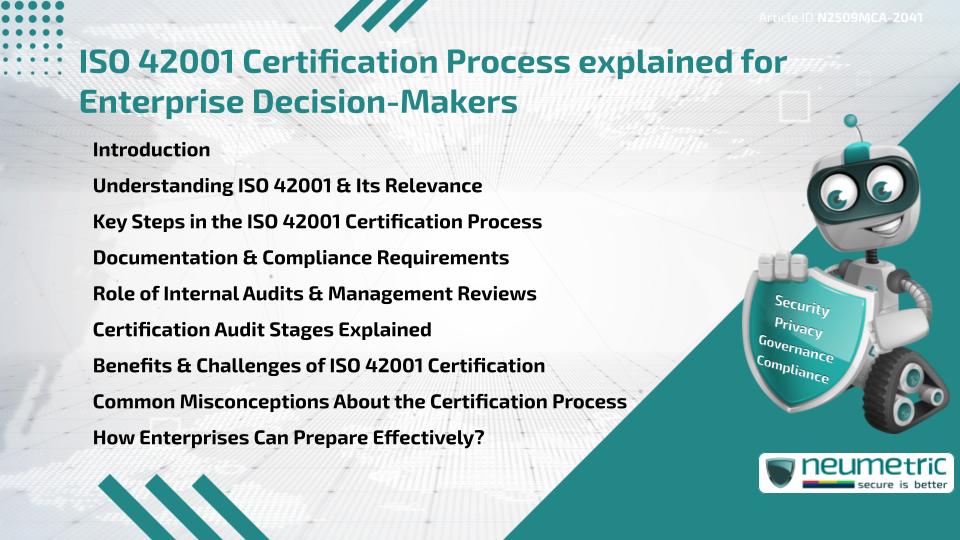Table of Contents
ToggleIntroduction
The ISO 42001 Certification Process provides enterprises with a structured Framework to establish, implement & continually improve their Artificial Intelligence Management System [AIMS]. For decision-makers, understanding this process is critical as it ensures Compliance with Ethical AI Practices, Risk Management & International Standards. This article explains what ISO 42001 is, why it matters, the steps involved in Certification, Audit requirements, common challenges & how enterprises can prepare effectively. By the end, readers will gain clarity on how the Certification Process can improve Trust, Governance & operational excellence.
Understanding ISO 42001 & Its Relevance
ISO 42001 is an International Standard specifically designed to govern the management of Artificial Intelligence systems. It helps enterprises establish responsible practices for AI deployment, covering Transparency, Accountability & Security. For industries adopting AI-driven solutions, certification is more than Compliance-it is a strategic decision to build Trust with Clients, Regulators & Stakeholders.
Much like how ISO 27001 ensures Information Security or ISO 9001 assures Quality, ISO 42001 validates that an organisation manages AI Systems responsibly. Without such a Framework, enterprises Risk reputational damage, legal exposure & operational inefficiencies.
Key Steps in the ISO 42001 Certification Process
The ISO 42001 Certification Process follows a structured path:
- Gap Analysis: Evaluating the current state of AI Governance versus the requirements of ISO 42001.
- Planning: Developing an implementation plan that addresses identified Gaps.
- Implementation: Establishing Controls, Documentation & Governance structures.
- Internal Audit: Assessing readiness before approaching external Auditors.
- Certification Audit: Engaging an Accredited Body to verify Compliance.
This systematic approach allows enterprises to progress logically without overlooking critical requirements.
Documentation & Compliance Requirements
Documentation is the backbone of certification. Enterprises must provide Evidence of:
- AI System design & Risk Assessments
- Policies for Transparency & Accountability
- Ethical Guidelines for AI use
- Monitoring & Continuous Improvement measures
These documents not only demonstrate Compliance but also act as proof of due diligence in case of disputes or regulatory inquiries.
Role of Internal Audits & Management Reviews
Internal Audits serve as practice runs for the external Certification Audit. They help identify Non-Conformities & areas for improvement. Management Reviews, on the other hand, ensure leadership oversight & alignment of AI Practices with business goals.
Without these reviews, enterprises Risk approaching Certification unprepared, which can delay or even prevent approval.
Certification Audit Stages Explained
The external Certification Audit typically occurs in two stages:
- Stage One Audit: A preliminary Assessment that reviews documentation & ensures readiness.
- Stage Two Audit: A detailed evaluation of how processes are applied in practice.
Upon successful completion, enterprises receive the ISO 42001 certificate, which is valid for three (3) years subject to Surveillance Audits.
Benefits & Challenges of ISO 42001 Certification
The benefits of Certification include enhanced Trust, stronger Governance, reduced Risks & Competitive differentiation. Clients & Partners gain confidence knowing AI Systems are responsibly managed.
Challenges, however, include resource allocation, staff training & aligning existing systems with Certification requirements. Smaller enterprises may find the process more resource-intensive than larger Organisations.
Common Misconceptions About the Certification Process
Several myths surround the ISO 42001 Certification Process:
- It is only for large enterprises. (In reality, Organisations of all sizes can certify.)
- Certification guarantees perfect AI Systems. (It demonstrates Governance, not flawlessness.)
- It is a one-time effort. (Continuous Monitoring & Improvement are mandatory.)
Dispelling these misconceptions helps decision-makers set realistic expectations.
How Enterprises Can Prepare Effectively?
Preparation requires more than documentation-it demands Cultural Alignment. Enterprises should:
- Train staff on AI Ethics & Compliance
- Assign clear responsibilities for AIMS oversight
- Conduct Mock Audits
- Engage Consultants if expertise is lacking
Such preparation ensures smoother Certification & long-term Compliance.
Takeaways
- The ISO 42001 Certification Process provides a structured Framework for AI Governance.
- It requires careful Planning, Documentation, Audits & Leadership oversight.
- Certification offers strategic benefits but demands sustained effort & resources.
- Misconceptions can lead to poor preparation, but proactive steps reduce Risks.
FAQ
What is ISO 42001 Certification?
It is an International Standard for managing Artificial Intelligence systems responsibly & ethically
How long does the ISO 42001 Certification Process take?
Typically between six (6) months & one (1) year depending on enterprise size & readiness.
Who can issue ISO 42001 Certification?
Only Accredited Certification Bodies recognised by International Accreditation Forums can issue the certificate.
Is Certification mandatory for enterprises using AI?
No, it is voluntary, but it demonstrates Accountability & builds Stakeholder Trust.
How often must Certification be renewed?
Every three (3) years, with Surveillance Audits conducted annually to maintain Compliance.
What happens if an enterprise fails the Certification Audit?
The organisation receives a report highlighting Gaps & can reapply after corrective measures.
Can small enterprises benefit from certification?
Yes, certification is scalable & offers credibility, even for Startups & Small Businesses.
Need help for Security, Privacy, Governance & VAPT?
Neumetric provides organisations the necessary help to achieve their Cybersecurity, Compliance, Governance, Privacy, Certifications & Pentesting needs.
Organisations & Businesses, specifically those which provide SaaS & AI Solutions in the Fintech, BFSI & other regulated sectors, usually need a Cybersecurity Partner for meeting & maintaining the ongoing Security & Privacy needs & requirements of their Enterprise Clients & Privacy conscious Customers.
SOC 2, ISO 27001, ISO 42001, NIST, HIPAA, HECVAT, EU GDPR are some of the Frameworks that are served by Fusion – a SaaS, multimodular, multitenant, centralised, automated, Cybersecurity & Compliance Management system.
Neumetric also provides Expert Services for technical security which covers VAPT for Web Applications, APIs, iOS & Android Mobile Apps, Security Testing for AWS & other Cloud Environments & Cloud Infrastructure & other similar scopes.
Reach out to us by Email or filling out the Contact Form…


